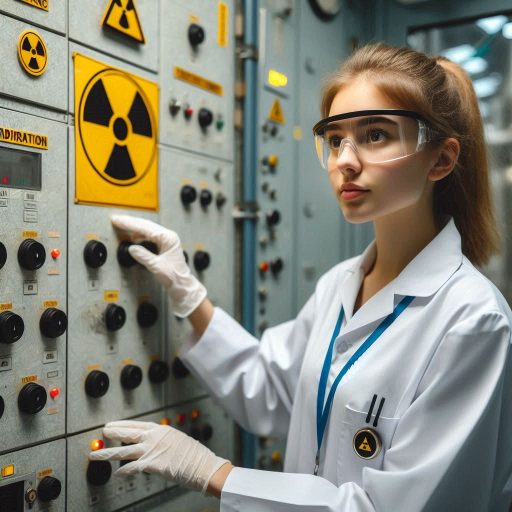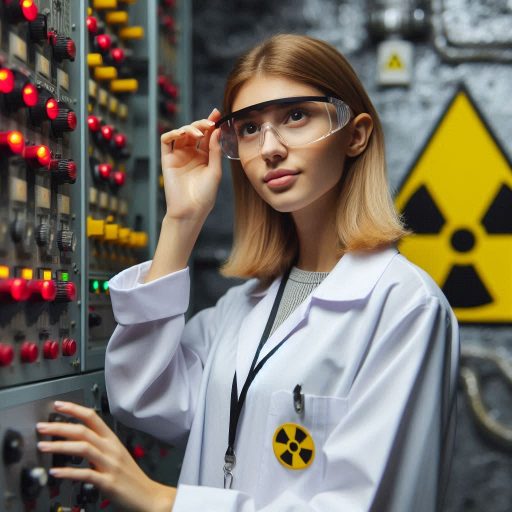Introduction
Nuclear scientists play a crucial role in understanding atomic particles and their interactions.
They study nuclear reactions, radiation, and their applications.
This field encompasses diverse areas, including energy production, medicine, and national security.
Their work helps advance technologies that impact daily life and global safety.
In energy production, nuclear scientists contribute to generating electricity through nuclear reactors.
They work on improving reactor designs, enhancing safety measures, and developing advanced fuel types.
Their research ensures that nuclear power remains a viable and sustainable energy source.
As the world seeks cleaner energy options, nuclear science plays a vital role in the transition to sustainable solutions.
Nuclear scientists also impact medicine significantly.
They develop techniques for medical imaging, such as PET scans and MRIs.
These innovations help doctors diagnose and treat various illnesses more effectively.
Furthermore, they explore radiation therapy to treat cancer, improving patient outcomes.
Their research leads to breakthroughs that save lives and enhance healthcare quality.
In the realm of national security, nuclear scientists focus on monitoring and preventing the proliferation of nuclear weapons.
They analyze nuclear materials to ensure compliance with international regulations.
Their expertise helps governments develop policies to manage nuclear risks and protect citizens.
By promoting global safety, nuclear scientists contribute to a more secure world.
Educational Background
To become a nuclear scientist, you must build a solid educational foundation.
Start with a bachelor’s degree in physics or a related field.
This degree provides essential knowledge about fundamental scientific principles.
Courses in mathematics, chemistry, and computer science are also crucial.
They prepare you for the advanced topics you’ll encounter later.
Bachelor’s Degree in Physics or Related Field
To begin your journey, earn a bachelor’s degree in physics or a related field.
This degree forms the groundwork for your scientific education.
You’ll study essential topics like mechanics, thermodynamics, and quantum physics.
These subjects lay the foundation for understanding nuclear processes.
Additionally, strong math skills are vital.
Courses in calculus and differential equations will support your future studies.
Master’s Degree in Nuclear Engineering or Nuclear Science
After completing your bachelor‘s degree, pursue a master’s degree in nuclear engineering or nuclear science.
This step deepens your understanding of nuclear processes and technologies.
Graduate programs often include hands-on experience through lab work.
You will study topics like reactor design, radiation safety, and nuclear fuel cycles.
Engaging in research projects during your master’s can enhance your practical skills.
Collaborating with faculty on research enhances your expertise.
PhD in Nuclear Engineering for Research Positions
Next, consider obtaining a PhD in nuclear engineering for research positions.
A doctoral degree opens doors to advanced research and academic opportunities.
PhD programs focus on in-depth studies and original research.
You will conduct experiments, analyze data, and develop innovative solutions.
This level of education allows you to specialize in a particular area of nuclear science.
Throughout your educational journey, seek internships and co-op programs.
Real-world experience is invaluable in the nuclear field.
These opportunities provide practical skills and industry connections.
Networking with professionals can lead to job opportunities after graduation.
Participating in student organizations related to nuclear science can also be beneficial.
Joining clubs or societies helps you connect with peers and mentors.
It can enhance your resume and provide leadership experience.
Attend conferences and workshops to stay updated on industry trends and advancements.
Stay engaged with the latest research and developments in nuclear science.
Reading scientific journals and publications will broaden your understanding.
Familiarizing yourself with current issues in nuclear energy and safety is crucial.
After earning your degrees, consider obtaining relevant certifications.
Certifications can enhance your qualifications and make you more competitive in the job market.
Look into organizations like the American Nuclear Society for certification opportunities.
They offer credentials that showcase your expertise in nuclear engineering.
In summary, the pathway to becoming a nuclear scientist is rigorous but rewarding.
It requires dedication to education and ongoing learning.
Start with a bachelor‘s degree in physics, advance to a master‘s, and consider a PhD.
Gaining practical experience through internships and certifications will enhance your prospects.
This educational journey lays the groundwork for a successful career in nuclear science.
Read: U.S. Cities with the Most Opportunities for Environmental Scientists
Internship Opportunities
Internships play a vital role in the pathway to becoming a nuclear scientist.
They provide essential practical experience, which is crucial for understanding theoretical concepts.
Classroom learning forms a solid foundation, but real-world applications deepen knowledge.
Internships bridge the gap between theory and practice.
They allow students to apply what they‘ve learned in a professional setting.
Importance of Gaining Practical Experience Through Internships
Gaining practical experience through internships is essential for aspiring nuclear scientists.
Engaging in internships can help develop valuable skills.
Interns gain hands-on experience with nuclear technology and research methods.
They learn to operate specialized equipment and analyze data.
This experience is essential for building a successful career in nuclear science.
Interns also improve their problem-solving abilities and critical thinking skills.
How Internships Can Provide Valuable Skills and Networking Opportunities
Internships offer significant networking opportunities.
Building relationships with industry professionals can open doors for future employment.
Interns often work alongside seasoned scientists, gaining insights into their careers.
These connections can lead to mentorship opportunities and job offers.
Many organizations prioritize hiring interns for full-time positions after graduation.
Examples of Companies or Research Institutions That Offer Internships in Nuclear Science
Several companies and research institutions offer internships in nuclear science.
The U.S. Department of Energy (DOE) provides numerous internship opportunities.
Their programs allow students to work on projects related to nuclear energy and national security.
Interns at the DOE often contribute to groundbreaking research.
Nuclear power plants also provide valuable internships.
Companies like Exelon and Duke Energy offer hands-on experiences for students.
Interns can work on operations, safety protocols, and engineering projects.
These internships offer insights into the daily workings of nuclear facilities.
Research institutions, such as Oak Ridge National Laboratory, provide another excellent option.
They focus on advanced nuclear technologies and renewable energy solutions.
Interns can participate in research projects that impact the future of energy.
Universities also play a significant role in offering internships.
Many have partnerships with industries and research centers.
These programs often connect students with internships tailored to their academic focus.
Students can work on university-led projects that involve collaboration with external organizations.
In review, internships are essential for aspiring nuclear scientists.
They offer practical experience, skill development, and networking opportunities.
Students should actively seek internships during their academic journey.
This proactive approach will enhance their knowledge and career prospects.
Engaging in internships with reputable organizations prepares students for successful futures in nuclear science.
Read: Environmental Scientist vs. Ecologist: Roles and Differences in the US
Specialized Training
Specialized training plays a vital role in the field of nuclear science.
It ensures that professionals possess the necessary skills and knowledge to work safely and effectively with nuclear technology.
This training focuses on essential areas like radiation safety, reactor operations, and nuclear waste management.
By gaining expertise in these areas, aspiring nuclear scientists can significantly contribute to public safety and environmental protection.
Importance of Specialized Training in Radiation Safety and Nuclear Technology
Radiation safety is a critical aspect of specialized training.
Understanding how to manage radiation exposure is essential for anyone working in nuclear science.
Proper training helps scientists minimize risks and protect themselves and others from harmful effects.
Organizations often provide training courses that cover radiation monitoring, safety protocols, and emergency response techniques.
These courses prepare individuals for real-world challenges in nuclear facilities.
Types of Certifications Available for Nuclear Scientists
Various certifications are available for nuclear scientists.
These certifications validate a professional’s knowledge and skills in specific areas of nuclear science.
The American Nuclear Society (ANS) offers several certification programs, including the Certified Nuclear Engineer (CNE) designation.
This certification demonstrates an engineer‘s proficiency in nuclear systems.
The National Registry of Radiation Protection Technologists (NRRPT) also offers a certification for radiation protection technologists.
This credential shows expertise in radiation safety practices.
Steps to Obtain Relevant Certifications and Licenses
Obtaining relevant certifications and licenses involves several steps.
First, aspiring nuclear scientists must choose a specialization area that aligns with their career goals.
Common specializations include health physics, nuclear engineering, and radiation protection.
After selecting a focus, individuals should research certification programs that match their interests.
Next, candidates need to complete the necessary educational requirements.
Many certification programs require a bachelor’s or master‘s degree in a related field.
Coursework in physics, engineering, and biology will provide a solid foundation.
After finishing their degree, candidates can enroll in specialized training programs or workshops to gain practical experience.
Once candidates complete their education and training, they can apply for certification exams.
Most programs require passing a written exam that assesses knowledge and skills.
Some certifications may also require a practical assessment to demonstrate proficiency.
After passing the exam, individuals can obtain their certification and showcase their qualifications to potential employers.
Additionally, maintaining certifications often requires continuing education.
Nuclear scientists must stay updated on advancements in the field.
This ongoing learning ensures that professionals remain competent and compliant with evolving regulations.
By investing in specialized training and obtaining certifications, aspiring nuclear scientists enhance their career prospects and contribute significantly to the nuclear industry.
Read: The Relationship Between U.S. Policy & Environmental Scientist Roles

Research and Publications
Importance of Conducting Research in the Field of Nuclear Science
Conducting research in nuclear science is crucial for advancing knowledge and technology.
It helps scientists explore new methods, enhance safety, and improve efficiency.
Research fosters innovation, driving the development of cleaner energy solutions.
Moreover, it allows scientists to address pressing global challenges, such as climate change.
How Publishing Research Papers Can Contribute to Career Advancement
Publishing research papers plays a vital role in career advancement.
It showcases expertise and establishes credibility in the field.
Peers and potential employers recognize published work as a marker of competence.
Furthermore, publications increase visibility and create networking opportunities within the scientific community.
They often lead to collaborations and funding, essential for further research endeavors.
Tips on How to Get Research Papers Published in Reputable Journals
Getting research papers published in reputable journals can be challenging, but several strategies can enhance your chances.
First, choose a relevant and impactful topic that fills a gap in existing literature.
Your research should address current issues in nuclear science or introduce innovative methodologies.
Conduct thorough literature reviews to understand what has been previously published.
Second, adhere to the journal‘s guidelines meticulously.
Each journal has specific requirements regarding formatting, structure, and submission protocols.
Following these guidelines demonstrates professionalism and respect for the editorial process.
It also ensures that your paper meets the expectations of reviewers and editors.
Third, collaborate with experienced researchers or mentors.
Their guidance can provide invaluable insights and feedback on your work.
They can also help refine your writing and improve the overall quality of your manuscript.
Collaborations can enhance the credibility of your research, as established authors often have a higher chance of publication.
Next, focus on writing clearly and concisely.
Publishing Success in Nuclear Science: Navigating Research and Peer Review
Effective communication is essential in conveying complex ideas.
Use straightforward language and avoid jargon that may confuse readers.
A well-organized paper that presents findings logically will engage reviewers and increase your chances of acceptance.
Finally, be prepared for revisions.
Peer review is a critical part of the publication process.
Reviewers may provide constructive feedback and suggestions for improvement.
Embrace this feedback as an opportunity to strengthen your work.
Revisions may take time, but they enhance the quality of your research and increase its impact.
Essentially, research and publications are cornerstones of a successful career in nuclear science.
Engaging in research allows scientists to push boundaries and solve significant problems.
Publishing work not only advances personal careers but also contributes to the broader scientific community.
By following strategic steps, aspiring nuclear scientists can effectively publish their research and make meaningful contributions to the field.
Transform Your Career Today
Unlock a personalized career strategy that drives real results. Get tailored advice and a roadmap designed just for you.
Start NowRead: Organizations & Associations for Environmental Scientists in the USA
Networking
Importance of Building a Professional Network in the Nuclear Science Industry
Building a professional network is crucial in the nuclear science industry.
Networking connects you with experienced professionals who can provide valuable insights.
These connections may lead to mentorship, collaboration, or job opportunities.
A strong network enhances your visibility and reputation within the field.
Ways to Network with Other Nuclear Scientists and Professionals
Attending industry conferences is one of the best ways to network.
These events gather leading experts and emerging scientists alike.
Engaging in discussions allows you to share ideas and learn from others.
Be proactive in introducing yourself to speakers and participants.
Exchange contact information to stay connected after the event.
Joining professional organizations also boosts your networking efforts.
Organizations such as the American Nuclear Society provide excellent platforms for meeting peers.
They often host webinars, workshops, and local chapter meetings.
Participating in these activities fosters relationships with fellow nuclear scientists.
Online platforms can also facilitate networking.
LinkedIn offers a space to connect with professionals in nuclear science.
You can join relevant groups and participate in discussions.
Share your achievements and insights to attract attention from industry experts.
Engaging in conversations on social media can help you build a strong online presence.
Volunteering for committees or working groups within professional organizations enhances your networking opportunities.
These roles allow you to collaborate closely with established professionals.
You can gain insights while showcasing your skills and dedication to the field.
This visibility can lead to recommendations for job openings or research projects.
How Networking Can Lead to Job Opportunities and Collaborations
Networking can significantly impact your job prospects.
Many positions in the nuclear science field are filled through referrals rather than job postings.
A solid network can alert you to unadvertised openings.
Additionally, collaborations often arise from personal connections.
Working together on projects can lead to shared successes and future opportunities.
Basically, networking is essential for success in the nuclear science industry.
It fosters relationships that can lead to collaborations and job opportunities.
Actively engaging with others in the field will enhance your career prospects.
By building a robust network, you position yourself for success in nuclear science.
Remember, your next opportunity may come from someone you meet today.
Find Out More: Climatology: Fieldwork vs. Laboratory Research
Continuing Education
In the rapidly evolving field of nuclear science, staying updated on advancements is crucial.
The landscape changes with new technologies, regulations, and research findings.
Nuclear scientists must embrace lifelong learning to remain competitive and informed.
Continuous education fosters innovation and ensures that scientists apply the latest techniques in their work.
This commitment helps advance personal careers and contributes to the overall progress of the nuclear industry.
Importance of Staying Updated on Advancements in Nuclear Science
In the field of nuclear science, staying informed about advancements is essential.
Emerging technologies and research findings reshape the landscape regularly.
Lifelong learning helps scientists apply the latest techniques and best practices in their work.
This commitment not only enhances personal expertise but also contributes to the field‘s growth.
By staying current, scientists can better address challenges and opportunities within the industry.
Options for Continuing Education in the Field
Numerous options exist for continuing education in nuclear science.
Many universities offer specialized programs focusing on nuclear engineering and radiation physics.
Online courses provide flexible learning opportunities for busy professionals.
Renowned organizations like the American Nuclear Society (ANS) also offer workshops and seminars.
These events facilitate networking with peers and experts in the field.
Attending conferences allows scientists to gain insights into cutting-edge research and developments.
Benefits of Pursuing Additional Certifications or Degrees in Nuclear Science
Pursuing additional certifications or degrees in nuclear science offers significant benefits.
Specialized certifications enhance a scientist’s expertise and credibility.
They demonstrate a commitment to professional growth and excellence.
Employers often value candidates with advanced certifications, as they indicate a deeper understanding of the subject matter.
Additionally, some organizations require specific certifications for certain roles within the nuclear sector.
Earning advanced degrees can further boost a scientist’s career.
A master’s or doctoral degree opens doors to advanced research positions.
These qualifications often lead to leadership roles in academia, government, or industry.
Graduates of advanced programs tend to have better job prospects and higher earning potential.
Moreover, engaging in research during graduate studies can contribute to meaningful advancements in the field.
Continuing education also provides opportunities for professional networking.
Scientists can connect with experts, share ideas, and collaborate on research projects.
Building a professional network is vital for career advancement in nuclear science.
These connections often lead to job opportunities and collaborations that can enhance one‘s career trajectory.
Moreover, staying updated on advancements in nuclear science cultivates a sense of purpose.
It empowers scientists to contribute to critical issues, such as energy sustainability and public safety.
As the world increasingly relies on nuclear technology, skilled scientists play a vital role in shaping its future.
Therefore, continuing education is essential for success in nuclear science.
It keeps professionals informed, enhances career prospects, and fosters a culture of innovation.
Pursuing advanced degrees or certifications can significantly impact one’s career and the broader field.
Embracing lifelong learning ensures that nuclear scientists remain at the forefront of their discipline.
By investing in education, they position themselves for a rewarding and impactful career.
Uncover the Details: Essential Skills for a Career in Neuroscience
Job Opportunities
Overview of Job Prospects for Nuclear Scientists
The job outlook for nuclear scientists remains strong and promising.
As technology advances, the demand for nuclear expertise grows.
Organizations increasingly seek professionals who can ensure safety and efficiency in nuclear processes.
According to the U.S. Bureau of Labor Statistics (BLS), employment for nuclear scientists is projected to grow by 6% over the next decade.
This growth indicates a need for skilled workers in this field.
Types of Industries That Hire Nuclear Scientists
Nuclear scientists find opportunities across various industries.
Government agencies, research institutions, and private companies all hire these experts.
The energy sector often seeks nuclear scientists for their knowledge of nuclear power plants.
Utilities require specialists to manage the safe operation of these facilities.
Additionally, nuclear scientists work in healthcare, particularly in medical imaging and radiation therapy.
Nuclear scientists also play a critical role in defense.
The Department of Defense employs experts to develop and maintain nuclear weapons systems.
Environmental agencies hire scientists to assess the impact of nuclear waste.
This diversity in employment sectors provides a range of job prospects.
Average Salary Range for Nuclear Scientists in Various Roles
The average salary for nuclear scientists varies based on experience and industry.
According to recent data, entry-level positions start around $65,000 annually.
With experience, nuclear scientists can earn significantly more.
Mid-career professionals typically make between $90,000 and $120,000 each year.
Senior scientists and managers often command salaries exceeding $150,000.
In academia, nuclear scientists can earn competitive salaries as well.
Professors and researchers in nuclear engineering may earn between $80,000 and $130,000.
Their salaries depend on their institution and research funding.
In the private sector, companies often offer additional benefits.
These may include bonuses, retirement plans, and health insurance.
Nuclear scientists in the pharmaceutical and biotechnology industries can also enjoy lucrative compensation packages.
In a nutshell, the job prospects for nuclear scientists are bright.
The field continues to evolve, creating new roles and opportunities.
Graduates can expect to find positions in various sectors, enhancing their career prospects.
The combination of competitive salaries and diverse job opportunities makes nuclear science an attractive career choice.
As the world relies more on nuclear energy and technology, the demand for qualified nuclear scientists will only grow.
For those passionate about science and dedicated to safety, this field offers a rewarding career path.
Uncover the Details: How to Get Your First Job as a Biostatistician
Conclusion
Becoming a nuclear scientist requires dedication, education, and passion.
This journey begins with a solid foundation in science and mathematics during high school.
Students should excel in subjects like physics, chemistry, and calculus.
Pursuing a bachelor’s degree in nuclear engineering or a related field is essential.
This step provides critical knowledge and skills needed in the field.
After completing a degree, aspiring scientists often pursue advanced studies.
Earning a master‘s degree or Ph.D. opens doors to specialized research and career opportunities.
Graduate studies enable students to delve into complex nuclear topics.
This level of education allows them to engage in groundbreaking research.
Many programs also offer internships or co-op experiences, which enhance practical skills.
Hands-on experience is crucial in the nuclear field.
Students should seek internships during their academic career.
These opportunities allow them to apply theoretical knowledge in real-world situations.
Networking with professionals in the industry is also beneficial.
Joining student organizations or attending conferences helps build valuable connections.
[E-Books for Sale]
The Big Book of 500 High-Paying Jobs in America: Unlock Your Earning Potential
$19.99 • 500 High-Paying Jobs • 330 pages
Explore 500 high-paying jobs in America and learn how to boost your career, earn more, and achieve success!
See All 500 High-Paying Jobs of this E-Book
1001 Professions Without a Degree: High-Paying American Jobs You Can Start Now
$19.99 • 1001 Professions Without a Degree • 174 pages
Discover 1001 high-paying jobs without a degree! Unlock career tips, skills, and success strategies for just $19.99!




